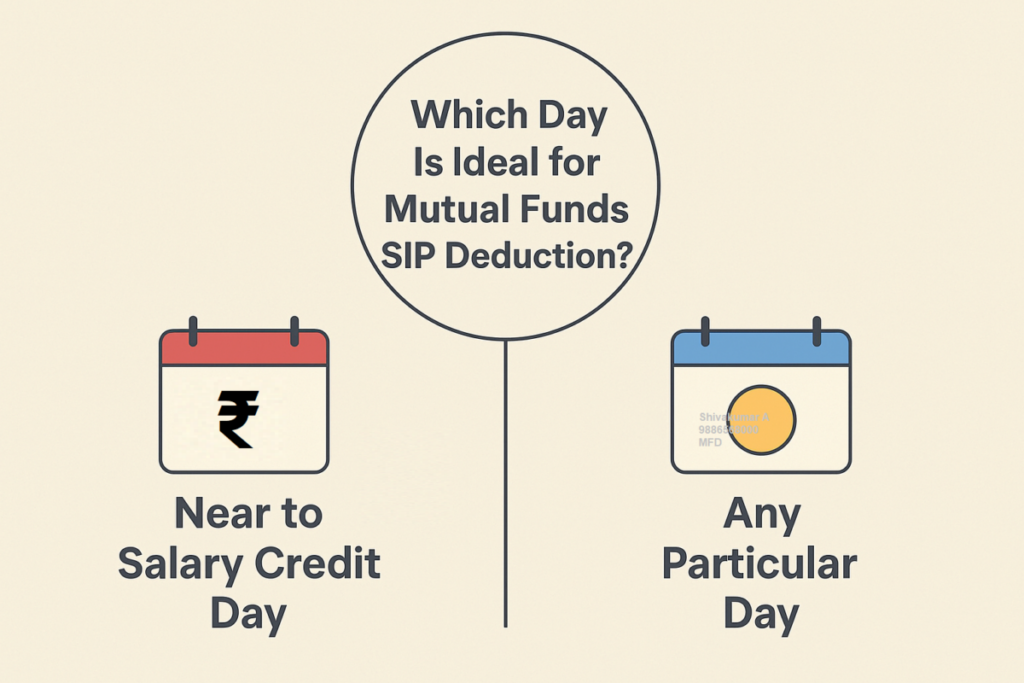Which Day Is Ideal for Mutual funds SIP Deduction
Near to Salary Credit Day or a anySpecific Date?
Systematic Investment Plans (SIPs) have become one of the most popular ways for salaried individuals to invest in mutual funds. By investing a fixed amount on a regular basis, SIPs help in cultivating financial discipline and leveraging the power of compounding and rupee cost averaging. We invest with the mind of withdrawing any time. At the same time, the investment should also be like that only. However, one common question among investors is: which is the best day for SIP deduction – right after the salary credit day or any other specific day of the month?
I had received calls, the investor asking for everyday sip of Rs. 1000/-. With reference to my experience every day SIP or monthly SIP is not the need, consistency and patience is needed than anything else.

While there’s no single “perfect” day universally applicable to all, the timing of SIP deductions can have implications on both financial discipline and cash flow management. Let’s explore the pros and cons of choosing a SIP date close to your salary credit day versus any other day in the month.
SIP Deduction Near Salary Credit Day
Most salaried individuals prefer SIP deductions within a few days of receiving their monthly salary — typically between the 1st and 7th of the month. This strategy is rooted in behavioral finance and helps streamline budgeting and spending.
Pros:
-
Better cash flow management: When SIPs are deducted early in the month, you’re effectively “paying yourself first.” You set aside your investment before any discretionary or unplanned expenses crop up.
-
Reduces risk of insufficient balance: Since salary is freshly credited, the chances of SIPs failing due to insufficient funds are low.
-
Promotes saving discipline: Aligning SIP deductions with your salary cycle reinforces consistency and builds a habit of prioritizing savings.
Cons:
-
High market NAVs at start of month? Some believe that fund NAVs may be higher at the start of the month due to bulk inflows. However, this is minor and doesn’t significantly impact long-term SIP performance.
SIP Deduction on a Specific Mid or End-of-Month Date
Some investors deliberately choose a mid-month or end-of-month SIP date (like the 15th or 25th) based on personal preference or cash flow patterns.
Pros:
-
Spaced out investments: If you have multiple SIPs or other EMI commitments, staggering them across the month can balance out deductions and prevent cash flow crunches.
-
Flexibility for second income or variable salary: Freelancers or dual-income households may prefer different SIP timings to suit their income patterns.
-
Potential NAV fluctuations: While timing the market through SIP date selection isn’t recommended, diversifying SIP dates across the month could slightly smooth out the rupee cost averaging process.
Cons:
-
Higher chance of failed transactions: If you spend heavily earlier in the month, there might not be enough funds for the SIP to go through, leading to missed investments or penalties from the mutual fund house.
-
Lower discipline: Waiting to invest mid or late in the month may expose you to impulse spending, reducing what’s left for investments.
Which Day Is Ideal for Mutual funds SIP Deduction
There’s no fixed “best day” for SIP deductions from a returns perspective — mutual funds are long-term instruments, and market fluctuations even out over time. What matters more is consistency, discipline, and ensuring SIPs don’t bounce due to insufficient funds.
For most salaried individuals, setting the SIP date within a few days of the salary credit date (say, 2nd to 5th of each month) is a smart and stress-free choice. It simplifies budgeting, ensures your savings goal is met upfront, and leaves the rest of the month for expenses.
If you have multiple income sources or prefer splitting investments, you can stagger SIPs across dates (e.g., 5th, 15th, and 25th) to suit your cash flows.
Summary
While the SIP deduction date might seem like a small detail, aligning it with your salary day can make a big difference in your financial discipline. The key is to automate your investments, avoid failed transactions, and stick to your SIPs for the long haul. Whether it’s the 2nd or the 25th, the best SIP date is the one that works best for your lifestyle and cash flow.
The investment is for you and by you, Which Day Is Ideal for Mutual funds SIP Deduction depends on the investor, let it be at your convenient time. Let it be as per your choice, returns are going to be the same if your investments are disciplined.


